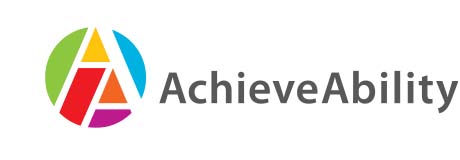The AchieveAbility 4th edition e-journal Launch at the RCSSD
RCSSD Press Release
On Thursday 18 April, Central hosted the launch of the 4th edition of the AchieveAbility E-Journal, “Neurodiverse Voices: Intergenerational Differences” in the Dench Studio.
achieveability-neurodiverse-voices-fourth-interactive-issue [pdf]
The AchieveAbility E-Journal is the research journal of AchieveAbility and shares the organisation’s overall commitment to promoting policy and delivering practice for successful educational, employment and training opportunities for people who are neurodivergent and dyslexic. Every year AchieveAbility commits to publishing an E-Journal issue, within the academic setting of a scholarly journal, on specific topics and key themes which offer opportunities for people to share their research, work, lived experience and creativity. Previous themes have included the inclusive workplace, good practice in the workplace in a time of COVID-19 and intersectionality and neurodiversity.
The 4th edition of the AchieveAbility E-Journal looks at the increasing profile of neurodivergent people and their intellectual capital across the generations. The theme of ‘intergenerational differences’ is voiced by a wide range of contributors who also span the generations. Their contributions are presented in both more formally academic and in alternative and creative formats.
Fifteen authors and interviewees contributed to “Neurodiverse Voices: Intergenerational Differences”, including Central staff member Cheri Shone and Central graduate Lennie Varvarides with a foreword provided by Central’s Principal Josette Bushell-Mingo.
The launch featured talks from Josette Bushell-Mingo, Professor Nicola Martin, Dr Melanie Thorley, Professor Debra Kelly, David Hermanstein, Becki Morris. From authors: James Carroll, Esther Efemini and Cheri Shone. Readings were provided by Joyce Dutch and Lennie Varvarides - the founder of Dyspla. A film screening of Dyspla’s work was also held. Authors Ann Dean and Nick Park were also in attendance
The evening was well attended by the AchieveAbility Board, contributing authors and their guests, alongside academics and professionals working within the broader field of neurodiversity, Central staff and students, representatives from government and members of the press.
Chair of the Westminster Autism Commission and Patron of AchieveAbility Barry Sheerman MP said:
“This fourth edition of the AchieveAbility E-Journal is devoted to the research, knowledge, experiences and creativity of its neurodivergent authors. The quality and range of contributions to this issue, ‘Neurodiverse Voices: Intergenerational Differences’ is outstanding. These voices are ground-breaking in the authenticity of their words, and I am very pleased to provide my support to this publication.
The AchieveAbility Editorial Board, comprising Professor Debra Kelly, David Hermanstein, Dr Katherine Hewlett MBE and Becki Morris, said:
“The range of contributions in this issue is outstanding in its passion and in the knowledge and insights of each discussion. These range from individual and collective academic research to thought-provoking opinion and testimonial pieces – sometimes underpinned by research, sometimes directly addressing the reader/viewer with lived experience, sometimes using the power of creativity, sometimes using a combination of all these – to creative expression in novel and poetic forms. The celebration of difference is integral to the collaborative nature of this e-journal. The value and power of neurodivergent voices is key to our ethos.”
Central Principal and CEO Josette Bushell-Mingo OBE said:
“Central strives to celebrate difference in all that we do, and we join AchieveAbility in celebrating the value of ‘different minds in different formats’ through this publication that promotes neurodivergent research and creative thinking. As Principal of Central – also neurodivergent – I am delighted to include the innovative AchieveAbility E-Journal as part of our ongoing work. We know it is unique as a platform for the voice of the neurodivergent person.”
In her review of the E-Journal, Professor Nicola Martin said:
“I very much enjoyed reading this journal from cover to cover. I appreciated the text breaks and in particular the talking heads. The range of contributors opened up the space for diverse perspectives. The main question that arose for me was around resilience. The journal is full of evidence of systems which do not serve neurodivergent people well and the question for me is why are people failed by the system then expected to develop various coping methods themselves. This journal has the potential to challenge thinking and to act as a provocation to society to change in order to eradicate unnecessary barriers to full participation experienced by neurodivergent people.”
All images are credited to Kazimir Bielecki of Dyspla. /https://www.dyspla.com/kazimirbielecki/
On Thursday 18 April, Central hosted the launch of the 4th edition of the AchieveAbility E-Journal, “Neurodiverse Voices: Intergenerational Differences” in the Dench Studio.
achieveability-neurodiverse-voices-fourth-interactive-issue [pdf]
The AchieveAbility E-Journal is the research journal of AchieveAbility and shares the organisation’s overall commitment to promoting policy and delivering practice for successful educational, employment and training opportunities for people who are neurodivergent and dyslexic. Every year AchieveAbility commits to publishing an E-Journal issue, within the academic setting of a scholarly journal, on specific topics and key themes which offer opportunities for people to share their research, work, lived experience and creativity. Previous themes have included the inclusive workplace, good practice in the workplace in a time of COVID-19 and intersectionality and neurodiversity.
The 4th edition of the AchieveAbility E-Journal looks at the increasing profile of neurodivergent people and their intellectual capital across the generations. The theme of ‘intergenerational differences’ is voiced by a wide range of contributors who also span the generations. Their contributions are presented in both more formally academic and in alternative and creative formats.
Fifteen authors and interviewees contributed to “Neurodiverse Voices: Intergenerational Differences”, including Central staff member Cheri Shone and Central graduate Lennie Varvarides with a foreword provided by Central’s Principal Josette Bushell-Mingo.
The launch featured talks from Josette Bushell-Mingo, Professor Nicola Martin, Dr Melanie Thorley, Professor Debra Kelly, David Hermanstein, Becki Morris. From authors: James Carroll, Esther Efemini and Cheri Shone. Readings were provided by Joyce Dutch and Lennie Varvarides - the founder of Dyspla. A film screening of Dyspla’s work was also held. Authors Ann Dean and Nick Park were also in attendance
The evening was well attended by the AchieveAbility Board, contributing authors and their guests, alongside academics and professionals working within the broader field of neurodiversity, Central staff and students, representatives from government and members of the press.
Chair of the Westminster Autism Commission and Patron of AchieveAbility Barry Sheerman MP said:
“This fourth edition of the AchieveAbility E-Journal is devoted to the research, knowledge, experiences and creativity of its neurodivergent authors. The quality and range of contributions to this issue, ‘Neurodiverse Voices: Intergenerational Differences’ is outstanding. These voices are ground-breaking in the authenticity of their words, and I am very pleased to provide my support to this publication.
The AchieveAbility Editorial Board, comprising Professor Debra Kelly, David Hermanstein, Dr Katherine Hewlett MBE and Becki Morris, said:
“The range of contributions in this issue is outstanding in its passion and in the knowledge and insights of each discussion. These range from individual and collective academic research to thought-provoking opinion and testimonial pieces – sometimes underpinned by research, sometimes directly addressing the reader/viewer with lived experience, sometimes using the power of creativity, sometimes using a combination of all these – to creative expression in novel and poetic forms. The celebration of difference is integral to the collaborative nature of this e-journal. The value and power of neurodivergent voices is key to our ethos.”
Central Principal and CEO Josette Bushell-Mingo OBE said:
“Central strives to celebrate difference in all that we do, and we join AchieveAbility in celebrating the value of ‘different minds in different formats’ through this publication that promotes neurodivergent research and creative thinking. As Principal of Central – also neurodivergent – I am delighted to include the innovative AchieveAbility E-Journal as part of our ongoing work. We know it is unique as a platform for the voice of the neurodivergent person.”
In her review of the E-Journal, Professor Nicola Martin said:
“I very much enjoyed reading this journal from cover to cover. I appreciated the text breaks and in particular the talking heads. The range of contributors opened up the space for diverse perspectives. The main question that arose for me was around resilience. The journal is full of evidence of systems which do not serve neurodivergent people well and the question for me is why are people failed by the system then expected to develop various coping methods themselves. This journal has the potential to challenge thinking and to act as a provocation to society to change in order to eradicate unnecessary barriers to full participation experienced by neurodivergent people.”
All images are credited to Kazimir Bielecki of Dyspla. /https://www.dyspla.com/kazimirbielecki/
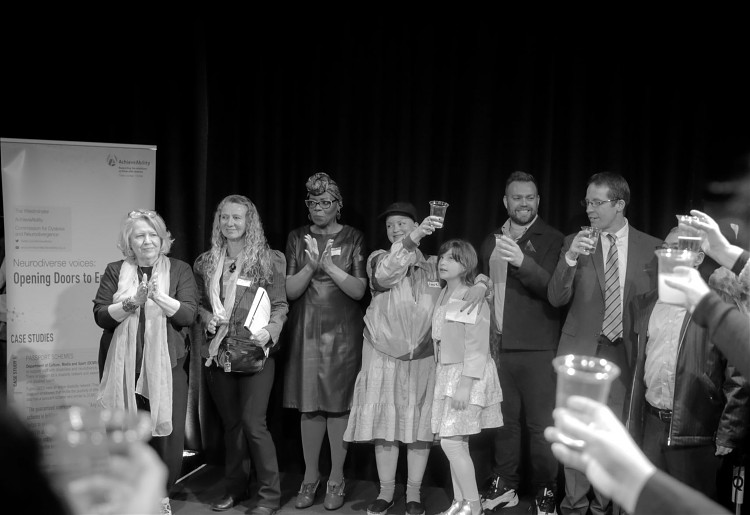
The Journal authors celebrated

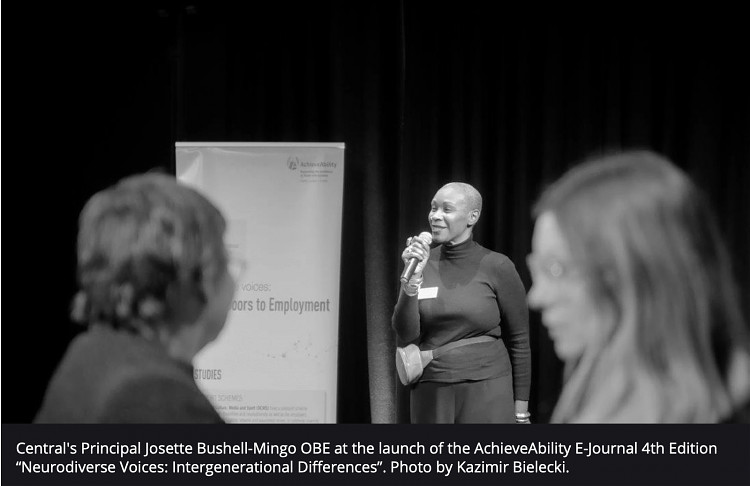


The AchieveAbility 4th edition of the e -journal. " Neurodiverse Voices: Intergenerational Differences"
In this issue, we have a welcome message from our Patron Barry Sheerman MP
The Foreword is by Josette Bushell-Mingo OBE, Principal of the Royal Central School of Speech and Drama (RCSSD).
We are delighted that the RCSSD hosts the journal. The Editorial Board provides the introduction.
Please share, circulate and disseminate amongst your colleagues and friends. shortened link:
AchieveAbility is sharing as from 11 March and during ND week
achieveability-neurodiverse-voices-fourth-interactive-issue [pdf]
The authors are:
Ann Dean, Differences and Similarities between Generations. Can we support each other collaboratively?
Jessica Dark, Breaking Away from Past Generational Concepts of Autism.
Contextualising Autistic People’s Experiences of Employment from a Neuro-Trait-Interaction Perspective.
Cheri Shone, Navigating the Intergenerational Experience of Neurodivergence using the VLR® and the Biopsychosocial Models
Nancy Doyle and Almuth McDowall, The Neurodiversity Movement. A Tipping Point. Community reflections on the lived experience of neurodivergent people through the lifespan (PowerPoint Presentation: art by Gabrielle Goodridge; editing by Marianne Cole)
Naomi Folb, The Paradoxes of Diverse (or Divisive) Identities
Esther Efemini, Dyspraxic Diamond
James Carroll and interviewees from St Mungo’s, Wayne Chin, Jason Why and Dan Sutton, Three Men. Three Inspiring Journeys of Discovery
Genevieve Mackenzie, Breaking the Code (with novel extracts)
Lennie Varvarides, The Phenomenology of Neurodivergence across Generations (with artwork made by Kazimir Bielecki)
Nick Park, Dyslexia Journal – How Times Have Changed With Dyslexia & Me
Joyce Dutch, “Out There” (poem)
AchieveAbility gets no funding to do this work and people give their time voluntarily. The e-journal does not have a paywall.
However, we ask that a small donation be sent to our Local Giving Button on our website to assist us with the publication costs:
In this issue, we have a welcome message from our Patron Barry Sheerman MP
The Foreword is by Josette Bushell-Mingo OBE, Principal of the Royal Central School of Speech and Drama (RCSSD).
We are delighted that the RCSSD hosts the journal. The Editorial Board provides the introduction.
Please share, circulate and disseminate amongst your colleagues and friends. shortened link:
AchieveAbility is sharing as from 11 March and during ND week
achieveability-neurodiverse-voices-fourth-interactive-issue [pdf]
The authors are:
Ann Dean, Differences and Similarities between Generations. Can we support each other collaboratively?
Jessica Dark, Breaking Away from Past Generational Concepts of Autism.
Contextualising Autistic People’s Experiences of Employment from a Neuro-Trait-Interaction Perspective.
Cheri Shone, Navigating the Intergenerational Experience of Neurodivergence using the VLR® and the Biopsychosocial Models
Nancy Doyle and Almuth McDowall, The Neurodiversity Movement. A Tipping Point. Community reflections on the lived experience of neurodivergent people through the lifespan (PowerPoint Presentation: art by Gabrielle Goodridge; editing by Marianne Cole)
Naomi Folb, The Paradoxes of Diverse (or Divisive) Identities
Esther Efemini, Dyspraxic Diamond
James Carroll and interviewees from St Mungo’s, Wayne Chin, Jason Why and Dan Sutton, Three Men. Three Inspiring Journeys of Discovery
Genevieve Mackenzie, Breaking the Code (with novel extracts)
Lennie Varvarides, The Phenomenology of Neurodivergence across Generations (with artwork made by Kazimir Bielecki)
Nick Park, Dyslexia Journal – How Times Have Changed With Dyslexia & Me
Joyce Dutch, “Out There” (poem)
AchieveAbility gets no funding to do this work and people give their time voluntarily. The e-journal does not have a paywall.
However, we ask that a small donation be sent to our Local Giving Button on our website to assist us with the publication costs:
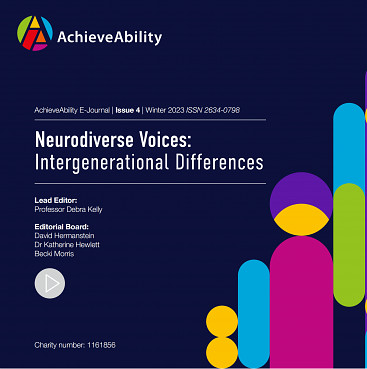
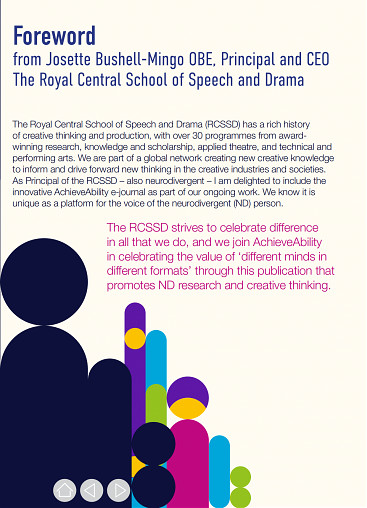

The AchieveAbility ejournal has received contributions to our 4th edition
The title is: Neurodiverse Voices: Intergenerational differences
The the themes were as follows:
or even submit a theme of your own under the title Neurodiverse Voices: Intergenerational differences
The increasing profile of neurodivergent people and their intellectual capital voiced across the generations
Neurodivergent led groups challenging policies and practice for more equitable experiences with assessment and good working practices.
The differences and similarities between generations, can we support each other collaboratively?
Comparative work/life experiences - a dialogue on what has changed, positively and negatively, what has stayed the same?
Social and economic factors of assessment (or lack) that impact on ND peoples’ choice of occupation.
What are the current options for ND people to re-enter formal education in comparison to the past such as (but not limited to) access courses and apprenticeships. What is inclusive education for all of us?
How do poor literacy skills impact on local and national economic growth, how does this compare across generations?
What are the risks of homelessness in today’s economic landscape for neurodivergent people across the generations?
An example of one of our successful submissions. The Neurodiversity Movement: A tipping point. Authors. Doyle N, McDowell A
The Neurodiversity Movement: A tipping point [pdf]
About the e-journal:
We know that neurodivergent people can be keen researchers and deep divers of information and creative, empathic thinkers for social change.
Sometimes our experiences can make us hesitate to write our research, or imposter syndrome kicks in – am I good enough?
Every year we publish an e-journal on specific topics and key themes. Previous themes have included the Inclusive Workplace, Good Practice in the workplace in a time of COVID-19 and Intersectionality and Neurodiversity.
Our Editorial Board is a mixture of people including academics who are neurodivergent. The Peer Reviewers are also neurodivergent people. The AchieveAbility E-Journal takes an inclusive editorial policy to encourage the particular experience, original thinking and preferred communication styles, formats and media of contributors. For text based submissions, this should be no longer than 2000 words
From our lived experience, we are aware that asking for feedback or placing yourself in a positively challenging situation can be triggering but we will support you in the following ways.
If you are working on research and/or creative projects this is what we can offer:
. Constructive feedback on submitted papers
. Workshop-style learning on key areas such as referencing and practical tips
. Opportunity to participate in a virtual and physical launch for the e-journal
We are a small charity so we are unable to fund creative projects, membership to access academic publications or time for research. However, here is some feedback on the journal so far.
‘The AchieveAbility journal is a fantastic achievement. At a time when co production and accessible research are hot topics, the editors have raised the bar several levels, by ensuring the inclusion of diverse voices from outside the academic mainstream. In doing so, they have maintained high standards of peer review, showing that you can absolutely combine quality research and dissemination with accessibility and lived experience’.
Professor Nancy Doyle (email to AchieveAbility April 2023)
‘Such a meaningful publication. I have enjoyed the like-minded connections, and I am encouraged that the journal is a platform for the neurodivergent voice’
Oliver West (email to AchieveAbility May 2023)
The journal aims to: </i>
• To provide a forum for exchange and debate that informs policy, strategy and practice on Neurodiversity within our society
• To support, promote and publish research-informed work of established and new academics and practitioners in the fields of education, training, employment, social justice and cultural change
• To foster interdisciplinary work of Neurodivergent authors to find new audiences in the journal fields
The journal uses standard British English, and the Editors reserve the right to alter usage to that end. The journal uses the Harvard (author-date) Reference System. Please make sure that all of the quotations, statistics, other research referred to, are fully and correctly referenced.
Use as few notes as possible. If you think a note is necessary, make it as brief and to the point as possible. Illustrations, diagrams, graphs, etc., are welcome.
A word about terminology, AchieveAbility uses the terms Neurodivergent, Neurodiverse and Neurodiversity.
The views expressed in articles in the AchieveAbility E-Journal are those of the authors of the contributions, and do not necessarily coincide with those of the Editorial Board or of the Editors of a particular journal issue.
Any queries concerning the format and presentation of articles may be addressed to the Editorial Board. If you have any questions, please contact: achieveabilityn@gmail.com
The title is: Neurodiverse Voices: Intergenerational differences
The the themes were as follows:
or even submit a theme of your own under the title Neurodiverse Voices: Intergenerational differences
The increasing profile of neurodivergent people and their intellectual capital voiced across the generations
Neurodivergent led groups challenging policies and practice for more equitable experiences with assessment and good working practices.
The differences and similarities between generations, can we support each other collaboratively?
Comparative work/life experiences - a dialogue on what has changed, positively and negatively, what has stayed the same?
Social and economic factors of assessment (or lack) that impact on ND peoples’ choice of occupation.
What are the current options for ND people to re-enter formal education in comparison to the past such as (but not limited to) access courses and apprenticeships. What is inclusive education for all of us?
How do poor literacy skills impact on local and national economic growth, how does this compare across generations?
What are the risks of homelessness in today’s economic landscape for neurodivergent people across the generations?
An example of one of our successful submissions. The Neurodiversity Movement: A tipping point. Authors. Doyle N, McDowell A
The Neurodiversity Movement: A tipping point [pdf]
About the e-journal:
We know that neurodivergent people can be keen researchers and deep divers of information and creative, empathic thinkers for social change.
Sometimes our experiences can make us hesitate to write our research, or imposter syndrome kicks in – am I good enough?
Every year we publish an e-journal on specific topics and key themes. Previous themes have included the Inclusive Workplace, Good Practice in the workplace in a time of COVID-19 and Intersectionality and Neurodiversity.
Our Editorial Board is a mixture of people including academics who are neurodivergent. The Peer Reviewers are also neurodivergent people. The AchieveAbility E-Journal takes an inclusive editorial policy to encourage the particular experience, original thinking and preferred communication styles, formats and media of contributors. For text based submissions, this should be no longer than 2000 words
From our lived experience, we are aware that asking for feedback or placing yourself in a positively challenging situation can be triggering but we will support you in the following ways.
If you are working on research and/or creative projects this is what we can offer:
. Constructive feedback on submitted papers
. Workshop-style learning on key areas such as referencing and practical tips
. Opportunity to participate in a virtual and physical launch for the e-journal
We are a small charity so we are unable to fund creative projects, membership to access academic publications or time for research. However, here is some feedback on the journal so far.
‘The AchieveAbility journal is a fantastic achievement. At a time when co production and accessible research are hot topics, the editors have raised the bar several levels, by ensuring the inclusion of diverse voices from outside the academic mainstream. In doing so, they have maintained high standards of peer review, showing that you can absolutely combine quality research and dissemination with accessibility and lived experience’.
Professor Nancy Doyle (email to AchieveAbility April 2023)
‘Such a meaningful publication. I have enjoyed the like-minded connections, and I am encouraged that the journal is a platform for the neurodivergent voice’
Oliver West (email to AchieveAbility May 2023)
The journal aims to: </i>
• To provide a forum for exchange and debate that informs policy, strategy and practice on Neurodiversity within our society
• To support, promote and publish research-informed work of established and new academics and practitioners in the fields of education, training, employment, social justice and cultural change
• To foster interdisciplinary work of Neurodivergent authors to find new audiences in the journal fields
The journal uses standard British English, and the Editors reserve the right to alter usage to that end. The journal uses the Harvard (author-date) Reference System. Please make sure that all of the quotations, statistics, other research referred to, are fully and correctly referenced.
Use as few notes as possible. If you think a note is necessary, make it as brief and to the point as possible. Illustrations, diagrams, graphs, etc., are welcome.
A word about terminology, AchieveAbility uses the terms Neurodivergent, Neurodiverse and Neurodiversity.
The views expressed in articles in the AchieveAbility E-Journal are those of the authors of the contributions, and do not necessarily coincide with those of the Editorial Board or of the Editors of a particular journal issue.
Any queries concerning the format and presentation of articles may be addressed to the Editorial Board. If you have any questions, please contact: achieveabilityn@gmail.com
